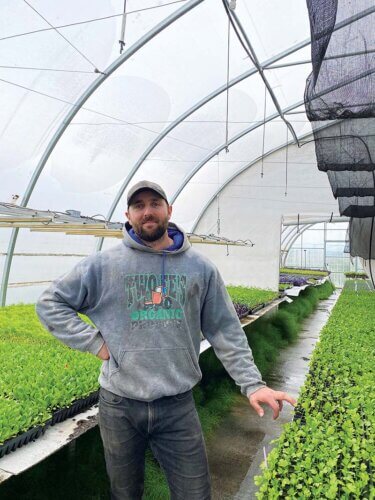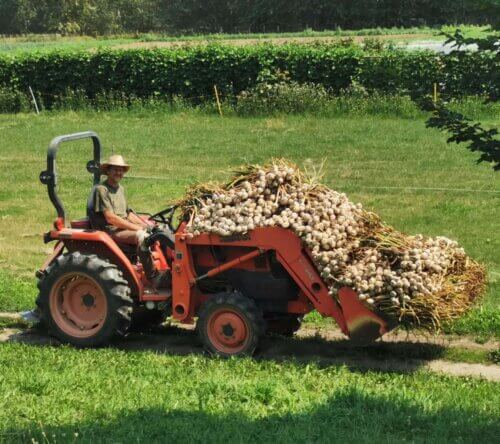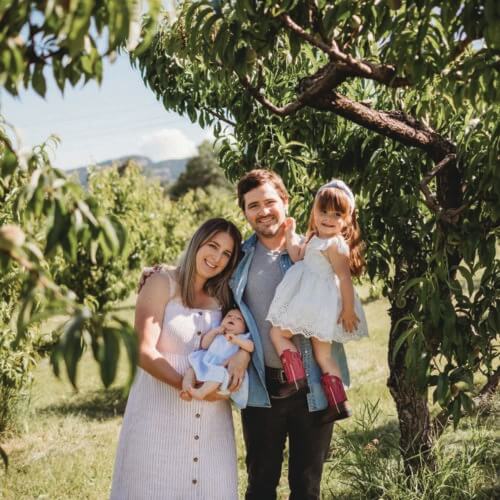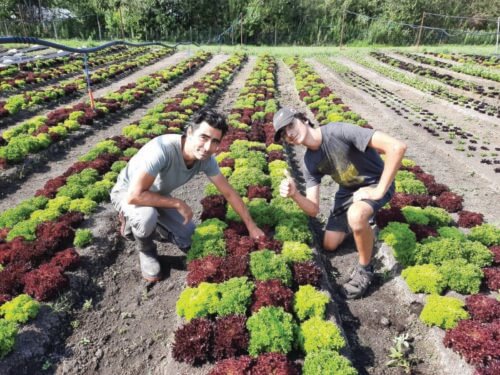“We know the story of these people.” Corporate Produce Specialist Laurie Yakelashek’s voice warms as she speaks about the special relationships she and her colleague, Produce Category Manager Tim Wachter, have cultivated with local organic farmers who supply Nature’s Fare Markets.
That relationship has been cultivated and nurtured over many years, as they work to source the best quality products for our customers, and our commissaries and Bistros in all seven locations in the Okanagan and Lower Mainland.
In fact, Tim and Laurie make it their mission to seek out, build and strengthen these relationships and take time to visit most growers at least once a season.
“We show them respect by showing up on their land and their farm—to visit them on their turf—and to learn about what they do,” says Laurie. “We’re in the field with them. We know their families, their crops and growing seasons, their soil, their challenges.
“And they appreciate our understanding of their trials and tribulations. And if a small grower can only supply one store, we support them, even if it might be a little more work for us. Bigger organizations just don’t do that.
“It’s more than a business relationship,” she says. “It’s a friendship.”
In the peak growing season, 75% of Nature’s Fare’s organic produce is locally grown. Last summer, fresh organic fruit and vegetables from 80 different growers in the Lower Mainland, Okanagan and the Interior found their way into stores.
A Respectful Partnership
“These connections are crucial and vital for us, for them and for our customers. We want local growers to focus on what they are best at, to grow with us,” explains Tim. “And we go out of our way to support them the best we can.”
Because of that vision, some farmers deal with Nature’s Fare Markets exclusively.
Even though the harvest is seasonal (typically April to November), the partnership to grow and sell produce is a year-round business. Tim and Laurie start by talking with growers about their previous season—including challenges of quality, production and numbers, and then move to crop planning to help farmers decide what and how much to grow in the coming year. They also explore opportunities to do something different.
“Differentiation is part of what we offer,” explains Tim. “Because we are smaller, we can try new things much easier than many bigger chains. Customers can often find more variety here.”
As the season progresses, Tim and Laurie stay in touch to see how farmers are doing and when they can deliver products at their freshest.
Mutual Benefits
“Some farmers are young up-and-comers who want to grow their business, and others—who have been with us for 25 or 30 years—are at the tail end of their careers, now trying to figure out succession planning,” says Laurie.
She worked closely with one grower who wanted to retire and downsize. Together, they did an analysis to determine which crop he grew best that would give him the most volume and profit per acre, and what Nature’s Fare needed, so that he could be successful and transition smoothly.
She and Tim worked with another grower to increase his kale crop sales to Nature’s Fare, by adding the production kitchen to the list of stores he supplied. Ultimately, he could quit his second job and work solely on his farm.
“Because we had such a strong connection, local growers who could deliver to our doorstep really saved us during the pandemic, when supply from across the country and across the border was a huge issue. They came through for us.”
A Tough Row to Hoe
“Over the past two years, we’ve had to deal with challenges we never imagined—including people’s ability to come to work through the pandemic, dramatic and often catastrophic environmental conditions and supply chain issues—that have impacted our ability to serve our customers,” said Tim.
Many more people now face food security issues as costs rise and shelves empty. For farmers, life has become more difficult and uncertain than ever. They’ve been directly impacted by fires, drought and heat domes; floods that obliterated many crops and livestock; and increased labour, transportation and fuel costs. Finding labour during the pandemic was the biggest challenge, as traditional seasonal labourers could not travel from across the country and across borders to harvest their crops. All this on top of the hurdles they face, every day, to become organic farmers.
• Getting certified organic is costly and time-consuming.
• Organic farmers don’t receive the same government subsidies as conventional farmers.
• Farming without pesticides and herbicides means more care and love by hand, and more labour costs.
That’s why organic produce costs more—and why it’s worth it: Organic farming means better soil, sustainability and biodiversity; more picked-ripe nutritious food; a lower carbon footprint of food grown close to home; and money that stays in the community.
“Organic farming is a struggle,” says Laurie. “It’s back-breaking, manual labour and epitomizes a farmer’s love and dedication for what they do. It’s sure not for the money. That’s why we insist on paying them fairly, and we don’t hammer them down on price. If they come in with a price that’s too low, we’ll insist on paying them a fair rate. We won’t undercut a grower—we want them to stay in business, to stay in our communities and to be sustainable. We have to make sure these farmers survive.”
Farm Tours

Two EE’s Organic Produce, Surrey BC
When Emil and Elizabeth Kowalski started their dairy farm and fruit stand before the Second World War, they probably never could have imagined the 100-year legacy their small farm would create.
Located between Surrey and Langley, the farm was purchased by Dutch florist and horticulturist Henk Schoen’s father-in-law in the 1960s. With Henk and his wife Jenny at the helm of production, Two EE’s Organic Produce shifted production to focus on organic fruits, vegetables, eggs and honey.
Today, under the guidance of Henk’s grandson Justin Vanderploeg, Two EE’s Organic Produce continues the legacy with a wide range of field vegetables including cilantro, pumpkins and everything in-between. And, while most of Vanderploeg’s produce is sold wholesale, he cherishes the longstanding relationship he’s built with Nature’s Fare.
By working directly with Nature’s Fare, Vanderploeg says, he’s able to adjust faster and ensure that customers always have delicious BC-grown produce. Plus, Vanderploeg says, he’s able to keep his fruits and vegetables fresher and looking better on the shelves.
As Two EE’s Organic Produce continues to combat challenges arising from unpredictable weather that sees extreme summer heat and torrential winter rainfall, Vanderploeg works to continue the family legacy by finding creative solutions and producing delicious and nutritious fruits, vegetables and herbs.

Roots & Greens Farm, Grindrod, BC
Situated along the winding and beautiful Shuswap River is Roots & Greens Farm, a small certified organic market garden.
A long-time producer for Nature’s Fare Markets, Roots & Greens grows a wide variety of fruits and vegetables in their Grindrod fields. In 2021 alone, Roots & Greens produced more than 40 different certified organic fruits, vegetables and herbs for Nature’s Fare. For a small family farm that cultivates a smaller quantity of a wide variety of quality produce, Roots & Greens Farm says their relationship with Nature’s Fare is invaluable.
Despite the challenges of heatwaves, drought and bugs—problems faced by all organic growers—Roots & Greens Farm has a simple yet profound reason to keep growing: they love raising nutritious produce for BC families to enjoy.
If they had to pick the biggest challenge they face every year, it’s the uneven distribution of the workload throughout the seasons. With summers spent in the sun growing a colourful spread of organic greens and autumns spent harvesting, only the middle of winter remains for some much-needed relaxation. However, the Roots & Greens team says camping in the snow just isn’t as much fun.

Sproule & Daughters Farm, Oyama, BC
New name, same great organic fruits: that’s what’s growing at Sproule & Daughters Farm.
Located in Oyama, BC, Sproule & Daughters Farm has roots dating back to 1946, when Garnet and Charlotte Sproule purchased the orchard. Three decades later and after a shift to cultivating certified organic produce in 2001, Brooke and her husband continue the family legacy. And, as the first Sproule matriarch to lead the farm, she felt it was time to change the name from Sproule & Sons to Sproule & Daughters Farm.
Sproule & Daughters grows a wide variety of stone fruits, including cherries, plums, nectarines, grapes and pears—but the farm’s focus is on producing delicious peaches. They even supply frozen peaches to Nature’s Fare Markets’ Bistro and commissary. With a business relationship that spans decades, the Sproules say they’re forever grateful to be a part of the Nature’s Fare family.
While Brooke grew up dreaming of a desk job, once she had her own family it was an easy decision to take over the farm in 2021, just ahead of the heatwave and a long, especially cold winter. Despite the challenges and uncertainty of climate change, Brooke walks the farm with her children, hoping to instill lessons of hard work and give them a beautiful life.

Amazia Farms, Oliver, BC
As outside competition grows and soaring fuel prices drive up production costs, Amazia Farms has a very simple reason for continuing to raise organic produce every season: it’s what they love doing.
Based in Oliver, BC, Amazia Farms produces a wide variety of local, organic crops, from arugula to zucchini. Amazia Farms believes in building close relationships with key supporters, such as Nature’s Fare Markets and local restaurants. And, unlike mono-crop producers who benefit from scaling efficiencies, Amazia Farms’ polyculture creates a sustainable farm ecology.
After founder Mike Kosaka first approached Nature’s Fare Markets in Penticton with a surplus of purple kale interplanted in their tomato rows, Amazia Farms’ relationship with Nature’s Fare has grown from 30 bunches a week of excess purple kale to more than 30 bunches each week of everything from salad mix to spinach, swiss chard, eggplants, parsley, carrots, parsnips, artichokes, peppers, garlic, arugula, head lettuce, kale, cucumber and countless other delicious greens.
For Amazia Farms, the key to food security and flavourful, nutritious food is proximity. And as production costs continue to soar due to the cost of fuel and seeds become more difficult to source, Amazia Farms plans to continue their labour of love.
